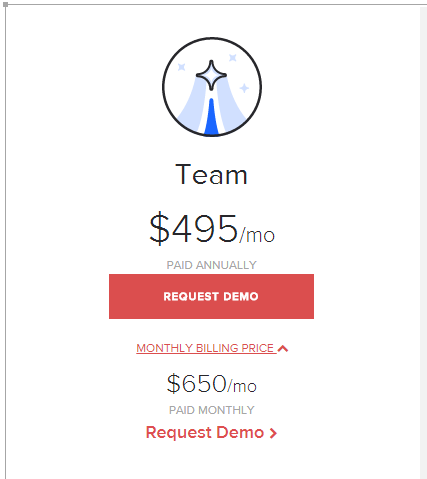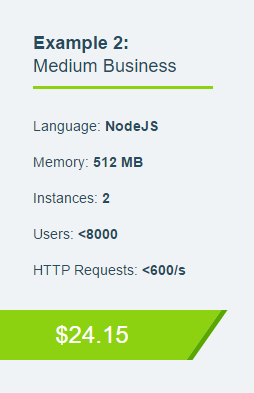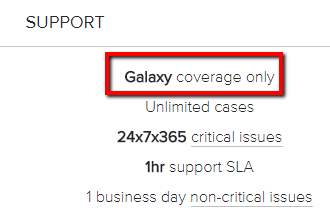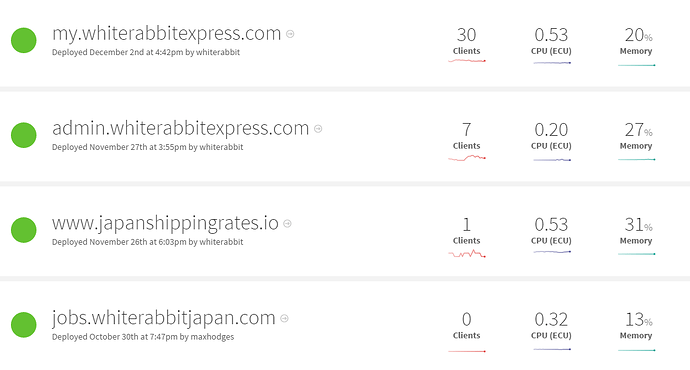We launched an important new eCommerce application into production on Modulus.io back in late July. Within a few weeks we started having various problems with availability and performance. Sometimes the app would flatline, and we were unable to restart it without getting help from Modulus customer support. Sometimes the entire Modulus control panel went down. Frustrated with all the time we were spending trying to analyze performance issues (which turned out to be some kind of load-balancer configuration problems, which have been plaguing Modulus for months.)
When MDG announced the Galaxy Early Access program, we were excited to switch. After hearing about the price ($495/month if paid annually) we decided it was too expensive, but agreed to try it anyway, during a money-back trial period, so we could help them test it as give them our feedback. The plan was to go back to Modulus, which was thousands of dollars cheaper per year. But after the trial, but we ended up signing up for a year at $6000 because Galaxy seemed reliable and freed us up to focus on our product development and market growth.
##Galaxy Team Plan

My biggest problem with Galaxy for mission-critical production apps is the price. They just don’t seem to understand the market, offering plans “for personal apps” starting at $13 per month and plans for production apps starting at $650 with nothing in between. I just don’t understand why they are so inflexible. Meteor is very popular with the startup community, and setting the minimum price for hosting a production app on Galaxy at $650 per month seems hostile to startups.
$650 ($495 if paid annually) on Galaxy buys you 10 x 1GB containers. But what if you only need 2 or 3? I just want a one-bedroom apartment, but I have to buy a 10 unit multiplex. At $650 each 1GB container costs $65, but why can’t I buy them à la carte? And what if I only need half the RAM? Even during Cyber Monday our RAM utilization was only around 20%. That would be less than 50% on a 512MB container. Why can’t I pay half as much for half the RAM?
I think part of the reason is that Galaxy probably expects customers to bother support a few hours a month so then need to pad the price to include support costs. But the only thing we’ve had to contact support about was adding domains to our account (because they don’t expose any way for us to do that ourselves.) So we are probably paying a premium for support which we don’t use. Why not adopt per incident support pricing like Microsoft?
I shared all these ideas with Galaxy team members, and warning them that the community was not going to be happy with plans starting at $500
##IBM Bluemix

IBM Bluemix an open-standards, cloud platform for building, running, and managing applications. Also noteworthy: IBM bought Compose the MongoDB development platform.
IBM has been interested in Meteor for years, and they’ve created short article and video on deploying Meteor apps to Bluemix. Best of all the pricing is exactly what I’ve been tell Galaxy they should do.
10 x 1GB containers on Bluemix would cost $477.75, which is about the same as you’d pay for Galaxy’s Team Plan. But the real advantage is the you can mix and match however you like. 10 x 512MB containers costs only $200.55. Or you could just get 2 x 512MB containers for only $24.15 because they give you 365 GB-Hours of memory for free each month.
But what about support?
Support pricing was a little hard to find. You have to sign up and login, then open the calculator under pricing.
###Free Support
There is a a Developers forum for free support, and they have a stackoverflow tag.
###Standard Support
- Developers forum.
- Ticketing system with 24-hour responsiveness.
- Connect with IBM technical staff.
- Covers IBM Bluemix services and features.
10% of account charges, with a minimum monthly charge of ¥21,000 JPY. (sorry my account in in Japan. That’s around $175 USD).
OK support looks expensive, but it seem like you could pay for a month, get all your questions answered, then turn it off for months at a time.
It’s too early for me to say if Bluemix is as reliable and performs as well as Galaxy. We are just getting started with it. But if it does we could save thousands of dollars a year by leaving Galaxy.
##Conclusion
In summary, if your hosting needs demand more than a sandbox, but less than 10 x 1GB containers, you may want to evaluate IBM Bluemix. If you actually need 10 x 1GB containers, you might want to stick with Galaxy their plan would include critical support without additional cost.
It will be interesting to see if Galaxy catches up with Bluemix, or if Bluemix continues to outpace Meteor in service and a more enlightened approach to pricing.


